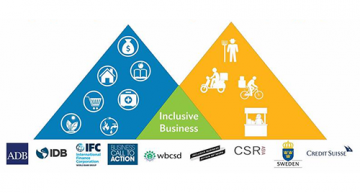G20 Policymaker Roundtable

As part of the 2nd Inclusive Business Asia Forum sponsored by the Asian Development Bank (ADB), the G20 Global Platform on Inclusive Business (GPIB) brought together a range of policymakers for an inclusive business roundtable discussion. Officials welcomed the opportunity to share their experience with fellow policymakers in a closed-door session. Participants included G20 members and non-members representing foreign affairs ministries, investment bureaus, and bilateral development finance institutions (DFIs), and aid agencies’ country, regional, or headquarter-level offices. Countries represented included Canada, France, Germany, Japan, Philippines, Sweden, United Kingdom, and the United States.
Approaches to Inclusive Business
Moderators Eriko Ishikawa of the International Finance Corporation (IFC) and Marcos Neto of the United Nations Development Programme (UNDP) introduced policymakers to the three approaches to inclusive business that are laid out in the G20 Inclusive Business Framework: inclusive business models, inclusive business activities, and social enterprise initiatives. Policymakers welcomed the background on the typology of inclusive business approaches and stated that the clear definitions would be particularly useful in helping their governments to identify where they were focusing their efforts. Ishikawa and Neto also identified the four enabling policy areas discussed in the framework--financial resources, information, capacity, and rules.
Policymakers discussed the challenges they face of explaining inclusive business to their colleagues and their desire to help their colleagues promote it and tangibly move the topic forward through their programming. Attendees cited the need for concrete guidance both in this area and in how to determine what makes a good inclusive business policy or program. Some bilateral aid agency representatives discussed how their programming is determined by the development priorities of their developing country partners. Some developed countries identified the potential to learn from their country’s own domestic experience supporting inclusive business.
Financial sustainability
The roundtable produced an active discussion on how to ensure that government funding for inclusive businesses would indeed be seed funding and that recipient organizations would continue on sustainably after the funding concludes. Multiple agencies shared their experience with particular inclusive business programs, such as challenge funds, and on providing financial assistance to companies for feasibility studies on inclusive business in developing countries.
How to design selection criteria to take into the recipient’s financial sustainability emerged as a common challenge felt by many. The idea was raised that policymakers should consider who will likely be financing the company once the project is over -- and then bring those people in during the selection process to advise on the long-term viability of the company. For example, engage with IFC (a multilateral DFI), bilateral DFIs, commercial banks, or private debt or equity funds. Participants saw the financial sustainability issue as especially important when working with small projects and/or companies that were not so commercially-oriented.
The idea that companies can face difficulties in getting start-up financing and in identifying local partners was also highlighted. Participants suggested that this could be an area where IFC, bilateral organizations, and others could play a more active role.
Closing the gap
Bridging the information gap was another area identified as being especially important. Policymakers find that many companies do not understand what kind of financial tools and associations already exist to help them. Bringing together relevant, practical information and disseminating to companies would be a valuable service. Moreover, sharing of concrete examples of what types of collaboration have worked between bilateral agencies and DFIs on inclusive business would be extremely beneficial.
Engaging with business
Getting input from business and business associations was acknowledged as valuable. Multiple agencies discussed the need for obtaining high-level company buy-in and for providing accompanying advisory services to help companies determine how they could pursue inclusive business and how they could measure their impact.
Policymakers also shared their specific mechanisms for engaging with the private sector on inclusive business. One participant shared a successful experience of establishing a group of CEOs to agree on inclusive business commitments, and the impact this had on generating concrete projects in emerging markets. The importance of having a local implementer was highlighted for cases where the company is not based locally.